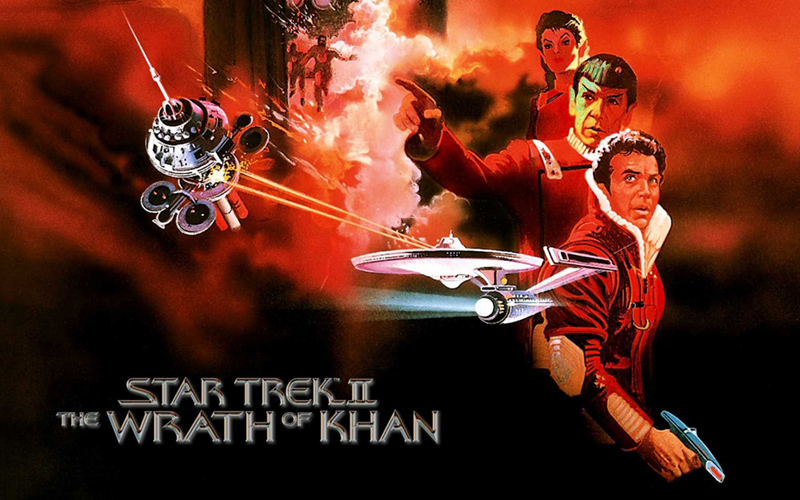Retro Review: Star Trek III: The Search For Spock
7 min readUpon learning that Spock’s consciousness is alive and housed in the brain of Dr. McCoy, Kirk and his crew steal the Enterprise to retrieve Spock’s body.
Plot Summary: The USS Enterprise returns to spacedock for what its crew assumes will be repairs after the battle with Khan, only to learn that the ship is being decommissioned. Meanwhile, Dr. McCoy behaves very oddly, breaking into Spock’s quarters and trying to find passage to the Genesis planet, which is currently off-limits except to the USS Grissom, where Saavik and David Marcus are studying it. Spock’s father Sarek visits and demands to know why Kirk has not returned Spock’s consciousness to Vulcan, which confuses Kirk until the two realize that Spock must have placed his living consciousness – what the Vulcans call katra – into McCoy’s mind during the meld just before Spock’s death. In order to preserve Spock’s essence, Kirk and his crew steal the deserted Enterprise, managing to escape because Scotty has sabotaged the engines of the new USS Excelsior. Kirk tries to contact the Grissom, unaware that a Klingon crew under Captain Kruge has learned of the Genesis torpedo and, believing it to be a doomsday weapon, gone to seek answers on the Genesis planet. The Klingons destroy the Grissom while David and Saavik are on the surface, where they find Spock’s empty coffin, then a rapidly-aging Vulcan child. When the Enterprise arrives, the Klingons damage the ship and take Saavik, David, and young Spock prisoner, killing David when Kirk refuses to give them information about Genesis. Desperate to save his crew, Kirk beams them to the surface and programs the Enterprise’s self-destruct mechanism, which is activated just as Kruge’s boarding party reaches the bridge. The Enterprise crew rescues Saavik and Spock, but Saavik warns them that David revealed a flaw in the Genesis matrix that will soon destroy the planet. Meanwhile, Kruge beams down and challenges Kirk, who defeats him and leaves aboard the Klingon ship with his crew just as the planet explodes. Arriving at Vulcan, the crew is met by Sarek, who asks the Vulcan priestess T’Lar to perform a rejoining ceremony to put Spock’s katra back in the regenerated body. The process is successful, and Spock slowly begins to remember his life on the Enterprise with Jim Kirk.
Analysis: I’m very much of a double mind about The Search For Spock, which wasn’t reviewed as well as The Wrath of Khan when it first opened and which usually finishes in fan surveys behind the other even-numbered original series films. I was thrilled when I first learned the planned name of this movie – I was a teenage Trekkie and desperately wanted Spock to come back, and it seemed like a promise, sort of like a loaded gun on stage, plus Leonard Nimoy directed it, which meant he’d surely be available to play the title role. Of course, with all that in place, the producers must have known they had to bring Spock back or risk the wrath of fans, who can be just as scary as Khan. I remember walking out of the movie theater being satisfied, despite the death of David – since Kirk had to pay in some way for cheating, as did David himself – and some perceived flaws in the screenplay. I had wanted Spock back, and I got that. Now, I didn’t grow up watching cartoons or reading comic books, so I wasn’t fully familiar with the concept that canonical character death didn’t necessarily signify, you know, the death of the character. I was aware that it happened on soap operas – a character would die under strange circumstances because the actor playing him would want to leave, then a few years later when he wanted to return, his demise would be somehow negated. I’d even seen this on Dallas, when Dusty Farlow, whose death I’d found devastating, came back to Sue Ellen Ewing, and I thought it was a cheat.
It didn’t occur to me that I could ever feel cheated in the same way by Star Trek – surely Star Trek would never betray me with cheap gimmicks or recasting or bad spinoffs or reboots! Particularly since the theme of The Wrath of Khan was about how eventually everyone has to face the no-win scenario, I thought Trek’s writers must really get it – that if death itself was going to be reversed, it had better not involve medical nonsense or technical wizardry and particularly not religious mumbo-jumbo like Aslan’s resurrection in Narnia, it had better have a solid explanation and a brilliant portrayal, and it had better be utterly unique. Here’s what happened because of Spock’s magical un-death: I lost the ability to mourn for characters in science fiction. When Tasha Yar died, I waved my hand and said, “Oh, she’ll be back,” and I was right. When Dukat killed Dax, I said, “She’ll be on next season,” and I was right. Voyager pretty much made sport of killing off characters, then reversing the timeline. I couldn’t work up any outrage over Tucker’s death on Enterprise because I’m convinced that in the franchise’s AU future, he’s alive and well…for all I know Pocket Books has done this already. I’m waiting for J.J. Abrams and team to announce they’re bringing William Shatner back as Kirk (and I must confess, I’m hoping that Shatner holds out, as he’s reputedly doing, for so much money that even they can’t afford him); I didn’t love Kirk’s death scene in Generations but I took it seriously, I don’t want him popping out of the Nexus and into the reboot. Do you think I cried for Gabrielle when she died (and returned) on Xena, for Iolaus when he died (and returned) on Hercules, for anyone who died (and returned) on The X-Files or Smallville or — well, I think I’ve made my point.
I’m sure this is all too much to blame on The Search For Spock, which, as I said, didn’t start the trend. But it’s a moment when Star Trek broke with what came before and never went back, which, looking from my current perspective, I think is a big loss. There’s plenty to like about the film itself, including a number of great lines spread out among all the major crewmembers – “Don’t call me tiny” (Sulu), “Sit in the closet” (Uhura), “Up your shaft” and”How else could I maintain my reputation as a miracle worker?” (Scotty), “The word is no – I am therefore going anyway” (Kirk), “That green-blooded son of a bitch” (McCoy) – as well as some big problems that have nothing to do with Spock’s return (the pon farr sequence with Saavik, one of my least favorite incidents in all of Trek history, makes me cringe to this day – David’s gratuitous murder is far easier to watch). The pacing of the film is quite snappy from the start, with much less time spent on visual nostalgia, which is reserved for a single glimpse of Janice Rand standing at attention as the battle-weary Enterprise arrives at spacedock. The Klingons arrive with a bang – literally, blowing up an ally’s ship because she saw the Genesis materials – and Christopher Lloyd is one my favorites, barking phrases in the made-up tongue with glorious conviction. I love what a huge, substantial role McCoy finally gets to play, and I love how DeForest Kelley plays him with Spock’s consciousness taking up space in his mind, somehow logical and cranky about it at the same time. The mind-meld between Kirk and Sarek is very moving, with both reliving Spock’s last moments and Kirk unafraid to express the depths of his feelings (“Your son meant more to me than you can know. I would have given my life if it would have saved his.”).
Then there’s some wonderfully fun space opera stuff – the Excelsior captain filing his nails because he’s so sure his ship is the fastest, the microbes on Spock’s coffin-torpedo turning into giant man-eating slugs, Kruge hollering that Genesis is the most powerful destructive weapon in existence and calling the Federation a gang of intergalactic criminals. The scene where Kruge hears the self-destruct countdown on the Enterprise and screams for his men to get out of there is delightful, even though the subsequent explosion is awfully loud in the vacuum of space (and why the bridge rather than the engine blows up has always been a point of confusion). There are also nice Star Trek details – the cameo by Grace Lee Whitney, the tribbles in the bar, Scotty’s ongoing hostility toward any class of ship said to be faster than the Enterprise, the wonderful new bird of prey that by now is more familiar to Next Gen fans. It’s odd to me that David gets as much grief onscreen from Kirk as Spock did, yet once David is gone, he’s pretty well forgotten. On Vulcan, Sarek, who has just put his logic at risk to save his own son, seems more grieved for Kirk than does Kirk himself. As for the Enterprise, I know there are fans – men in particular – who say they cried when the great ship went down, but I’ve never even blinked. Did anyone ever really doubt that Kirk would sacrifice the Enterprise for Spock?






